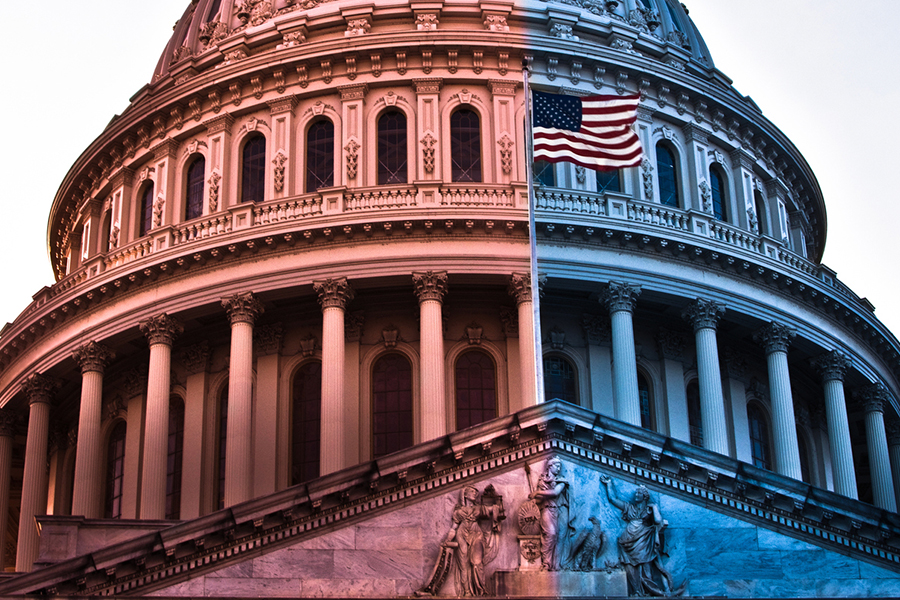
Tepper School Study Reveals Voter Moral Justifications for Politicians' Misstatements
In a new study, researchers used online surveys conducted primarily when Donald Trump was president to show that both Republican and Democratic voters provided explicit moral justification for politicians’ statements that were factually inaccurate, especially when they aligned with their personal politics.
The study was conducted by researchers at Carnegie Mellon University, Rice University, the University of Colorado-Boulder, and Massachusetts Institute of Technology. It is in press at the American Journal of Sociology.
 “What we found is that political misinformation isn't just about whether voters can tell facts from fiction,” said Oliver Hahl, associate professor of organization theory, strategy, and entrepreneurship at Carnegie Mellon’s Tepper School of Business, who coauthored the study. “It seems like it's more about how statements, whether true or not, speak to a broader political agenda.”
“What we found is that political misinformation isn't just about whether voters can tell facts from fiction,” said Oliver Hahl, associate professor of organization theory, strategy, and entrepreneurship at Carnegie Mellon’s Tepper School of Business, who coauthored the study. “It seems like it's more about how statements, whether true or not, speak to a broader political agenda.”
Researchers conducted six surveys to gauge voters’ responses to statements by politicians that flouted the norm of fact-grounding (i.e., that one should stick to facts when giving a statement) while proclaiming deeper, socially divisive “truths.” Five were conducted during Trump’s presidency and one was conducted in the spring of 2023. Participants were recruited from either Amazon’s Cloud Research Platform, a crowd-sourcing platform that assists people with virtual tasks, or Prolific, a research platform that provides academics and companies access to participants for studies and surveys.
All six surveys had similar structures and questions, though some questions were specific to a particular political context. Each survey gauged voters’ reactions to false statements by politicians, including Trump, Governor Ron DeSantis of Florida, President Joe Biden, and Representative Alexandria Ocasio-Cortez of New York.
The results of all the surveys showed a significant tendency by partisans to deliberately support violations of the norm of fact-grounding, justifying these factually inaccurate statements in moral terms when they could have relied on a factual justification. The surveys also provided consistent evidence that voters distinguish between objective evidence and truth, favoring the latter when judging statements of favored politicians and the former when judging disfavored candidates.
Importantly, results from the last two surveys indicated significant moral flexibility among both Democrats and Republicans.
The results challenge the common belief that partisan voters' positive reactions to misinformation from their party leaders are solely because of laziness or bias leading them to confuse factually inaccurate information for truth. Instead, the evidence consistently shows that voters are flexible with the facts – exhibiting factual flexibility.
Yet they also provide consistent evidence of moral flexibility, whereby voters justify demagogic fact-flouting, or disregarding or ignoring facts, as an effective way of proclaiming a deeply resonant political “truth.” A key implication is that political misinformation cannot be eliminated by getting voters to distinguish fact from fiction; voters’ moral orientations may be such that they prefer fact-flouting.
In most studies, Trump supporters showed considerable flexibility with the facts regarding his statements. However, the study focusing on the “big lie,” which surveyed only those who voted for Trump in 2016, proved to be an exception.
Conducted in 2021, the survey explored voters’ responses to Trump’s claims that the 2020 U.S. presidential election was “rigged” or “stolen.” Participants were more likely to consider Trump’s allegations as grounded in objective evidence rather than subjective viewpoints.
Compared to other topics, Trump’s allegations that the election was stolen were portrayed as factual. There is less moral flexibility with this issue, possibly because these claims were presented more as facts. However, the emphasis on factual accuracy concerning the big lie still varies based on people’s political affiliations.
Among the limitations of their work, the authors note that the statements used in the surveys represented just one type of political misinformation (demagogic fact-flouting by partisan politicians). In addition, the measurement and analysis strategy used was new and lacked a track record, and the samples were not nationally representative.
“Our findings reiterate the sociological insight that commitment to democratic norms cannot be assumed and indicate the importance of that caution when it comes to the problem of political misinformation,” said Minjae Kim, Assistant Professor of Management at Rice University’s Jones Graduate School of Business, and study coauthor.
“In particular, efforts to combat voters’ positive response to misinformation cannot be limited to teaching them to simply work harder to digest accurate information (e.g., fact-checking).”
